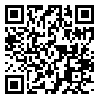BibTeX | RIS | EndNote | Medlars | ProCite | Reference Manager | RefWorks
Send citation to:
URL: http://hnmj.gums.ac.ir/article-1-298-en.html

 1, Samira Shasti
1, Samira Shasti 
 , Shadman Reza Masouleh
, Shadman Reza Masouleh 
 , Abdolhossein Emami Sigarodi
, Abdolhossein Emami Sigarodi 
 , Zahra Atrkar Roshan
, Zahra Atrkar Roshan 

Study the Life Skills of 11-19 year old Children affected by Thalassemia referring to Educational and Remedial Centers in Rasht city from their Mothers’ Point of View 2009-2010
By: Samira Shasti1, Seyedeh Noshaz Mirhaghjou2, Shadman Reza Masouleh3, Abdolhossein Emami Sigarodi4, Zahra Atrkar Roshan5
Abstract:
Introduction: Children who are affected by chronic diseases such as thalassemia have more mental and social problems in compare with healthy people. Adopting to such conditions needs awareness of the ways to overcome these problems. Gaining life skill together with knowledge and science and appropriate change of attitudes, values and reinforcement of appropriate behaviors lead to normal behaviors which reduce problem and obstacles of health and therefore increase mental health.
Objective: This research aimed to determine life skills of 11-19 year old children affected by thalassemia who refer to Educational and Remedial Centers in City of Rasht from their Mothers’ point of view in 2009-2010.
Methods: This research is a cross sectional descriptive study in which 150 mothers of children affected by thalassemia, who refer to educational and remedial centers of the city of Rasht participated. Tools applied to collect data in this research are a certain questionnaire which includes two parts of demographic data and life skill. Descriptive and analytical statistics were used for data analysis.
Results: Findings showed that most children’s cognitive, social and emotional skills were relatively good from their mothers’ point of view and among the three areas of life skills they had the least skill in cognitive skill and the most in social skill.
Conclusion: The results showed that 68% of children whose mothers were studied had appropriate skills from their mothers’ point of view.
Key words: Chronic Disease, Beta-Thalassemia, Life Skill, Social skill, Mother, Child
1. MSc in nursing education (community health)
2. MSc in midwifery, Faculty member of Guilan University of Medical Sciences
3. MSc in nursing education (Medical-surgical), Faculty member of Guilan University of Medical Sciences
4. PhD student in nursing, Faculty member of Guilan University of Medical Sciences
5. PhD student in biostatistics, Faculty member of Guilan University of Medical Sciences
Received: 2014/08/24 | Accepted: 2014/08/24 | Published: 2014/08/24
| Rights and permissions | |
 | This work is licensed under a Creative Commons Attribution-NonCommercial 4.0 International License. |

